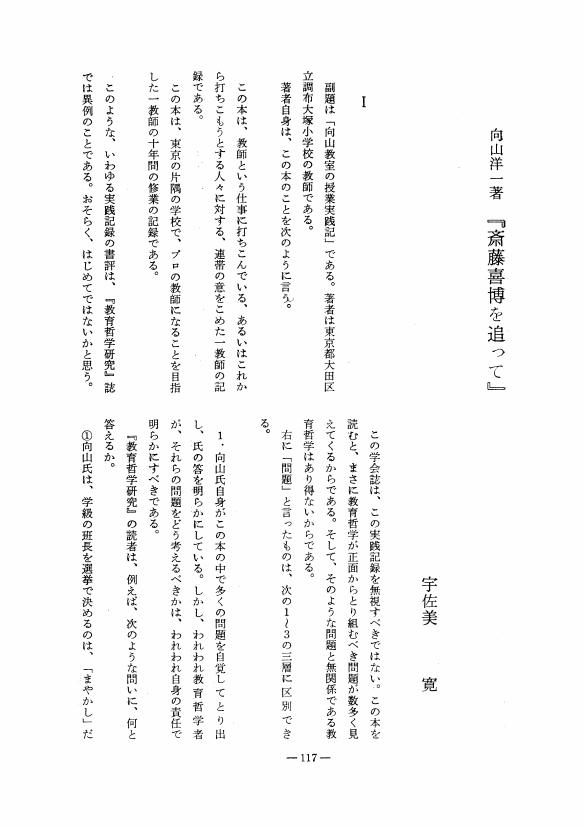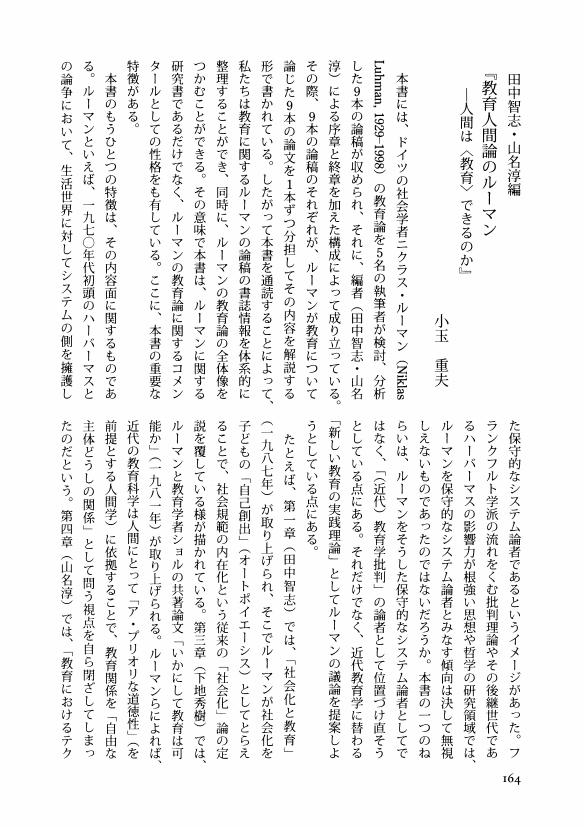10 0 0 0 OA 「はいまわる経験主義」の再評価 知識生長過程におけるアブダクションの論理
- 著者
- 池田 久美子
- 出版者
- 教育哲学会
- 雑誌
- 教育哲学研究 (ISSN:03873153)
- 巻号頁・発行日
- vol.1981, no.44, pp.18-33, 1981-11-15 (Released:2009-09-04)
- 参考文献数
- 18
The experience-oriented learning was heavily criticized as causing learners to 'crawl-about' for trivial facts. But this criticism not only failed to take account of the potential of proliferation of codes formed through experience-oriented learning, but also disturbed the study of their proliferation. A similar mistake was made also by those who defended the experience-oriented learning. Both, the accuser and the defender of the experience-oriented learning, were equally restricted within the frame of the dichotomy of 'experience' and 'knowledge' distorted by a deductive theory of knowledge.Contrary to this dichotomy, it is necessary to construct the theory of learning on the basis of the logic of abduction. The author tries to prove that learning should be regarded as a proliferation of codes; hence the learner first of all must try to transform codes temporarily by abduction. The codes activate the inherent selfproliferating tendency when they fulfil the required conditions to cause abduction.It is through the very 'crawling-about' that these conditions are fulfilled, so it is absurd to maintain that the 'crawling-about' prevents the learner from growing in knowledge. The 'crawling-about' is never fruitless, but should be accepted as the indispensable foundation for subsequent learning.
7 0 0 0 「新優生学」と教育の類縁性と背反:「他者への欲望」という視座
- 著者
- 森岡 次郎
- 出版者
- The Japanese Society for the Philosophy of Education
- 雑誌
- 教育哲学研究 (ISSN:03873153)
- 巻号頁・発行日
- no.93, pp.102-121, 2006
- 被引用文献数
- 1
The purpose of this paper is to examine new eugenics and education.<BR>For the last several years, such ideas as "Designers Baby" and "Perfect Baby" have been discussed in terms of "New Eugenics". This idea means the artificial production of babies by genetic technology according to the desire of parents. If educational values can be realized to some extent by genetic technology, new eugenics will necessitate our views on education to change. From this perspective, this paper examines the implications of new eugenics for education.<BR>First of all, the history of eugenics is surveyed and new eugenics is positioned historically. Here, new eugenics can be positioned in an eugenical trend after the 1970s. Next, the theoretical features of new eugenics are clarified in its contrast to old eugenics. This makes it clear that new eugenics is based on the principle of selfdetermination and on the principle of scientific validity. (2) <BR>Then, the criticisms of new eugenics are reviewed. Here, by considering Glen McGee's and others' arguments, it becomes clear that any fatal criticism of new eugenics does not exist yet. However, in the argument by Jürgen Habermas, education and new eugenics are distinguished in view of the existence of "others." It enables us to find out a positive value to the conditions of "others" in education that cannot be fully satisfied. (3) <BR>Finally, it is clarified from the standpoint of the system theory of Niklas Luhmann that children as "others" are indispensable as the media in an educational system. Based on Emmanuel Levinas' concept of "désir", I present the point of view of "the desire for others", one that gives a positive value to the "existence of others". (4) <BR>"New eugenics" and education have affinity in terms of operational intervention in children. However, from the point of view of "the desire for others", it becomes clear that both are fundamentally in conflict.
5 0 0 0 OA 向山洋一著『斎藤喜博を追って』
- 著者
- 宇佐美 寛
- 出版者
- 教育哲学会
- 雑誌
- 教育哲学研究 (ISSN:03873153)
- 巻号頁・発行日
- vol.1981, no.43, pp.117-122, 1981-05-10 (Released:2009-09-04)
5 0 0 0 OA 坂倉裕治著『ルソーの教育思想-利己的情念の問題をめぐって -』
- 著者
- 坂本 雅彦
- 出版者
- 教育哲学会
- 雑誌
- 教育哲学研究 (ISSN:03873153)
- 巻号頁・発行日
- vol.1999, no.80, pp.89-95, 1999-11-10 (Released:2009-09-04)
4 0 0 0 OA 「教育哲学」は、なぜ不毛なのか
- 著者
- 宇佐美 寛
- 出版者
- 教育哲学会
- 雑誌
- 教育哲学研究 (ISSN:03873153)
- 巻号頁・発行日
- vol.1998, no.78, pp.34-44, 1998-11-10 (Released:2009-09-04)
- 著者
- 鈴木 美南子
- 出版者
- 教育哲学会
- 雑誌
- 教育哲学研究 (ISSN:03873153)
- 巻号頁・発行日
- vol.1988, no.57, pp.108-111, 1988-05-10 (Released:2009-09-04)
4 0 0 0 OA 田中智志・山名淳編『教育人間論のルーマン-人間は〈教育〉できるのか』
- 著者
- 小玉 重夫
- 出版者
- 教育哲学会
- 雑誌
- 教育哲学研究 (ISSN:03873153)
- 巻号頁・発行日
- vol.2006, no.93, pp.164-166, 2006-05-10 (Released:2010-05-07)
4 0 0 0 OA カントにおける道徳教育方法論の思考法
- 著者
- 中沢 哲
- 出版者
- 教育哲学会
- 雑誌
- 教育哲学研究 (ISSN:03873153)
- 巻号頁・発行日
- vol.2001, no.83, pp.60-75, 2001-05-10 (Released:2010-05-07)
- 参考文献数
- 39
Der Zweck dieses Aufsatzes ist Kants Methodenlehre der moralischen Erziehung zurekonstruieren, indem der Vf. Kants Denkart einer Methode der moralischen Erziehung im Zusammenhang mit der Denkart der Beziehung zwischen “dem naturlichen gesunden Verstande” und dem Begriff des guten Willens in der Grundlegung zur Metaphysik der Sitten betrachtet, urn dadurch Kants Absicht in der Methodenlehre zu klären.Die moralische Erkenntniskraft des Schülers ist die “gemeine Menschenvernunft”. Kant schlagt ein “Bruchstiick eines moralischen Katechismus” als Methode der moralischen Erziehung vor (Metaphysik der Sitten). Dieser sokratische Katechismus wird aus der gemeinen Menschenvernunft im Kind entwickelt. Der Schiüler antwortet mit seinem guten Verstand. Dadurch wird der Schiüler sich “eines solchen guten und tätigen Willens” bewußt.Die gemeine Menschenvernunft ist der Ausgangspunkt der Entwicklung der Moralphilosophie in der GMS. Kant behauptet, daß der Begriff des guten Willens dem natürlichen gesunden Verstand (der gemeinen Menschenvernuft) beiwohne. Dieser Begriff ist aber bei ihm nicht klar. Kant hat ihn in der GMS geklärt. Das Urteil der gemeinen Menschenvernuft hat seinen Ursprung im Wollen des guten Willens.Das moralische Prinzip für den Lehrer, der in der moralischen Erziehung “sokratisch zu katechisieren versucht”, ist die “dunkel gedachte Metaphysik”, d. h. der Begriff des guten Willens. Der Schüer wird durch die moralische Erkenntnistatätigkeit sich des eigenen Wollens des guten Willens klar bewußt. Die Denkart der Beziehung zwischen “dem natürlichen gesunden Verstande” und dem Begriff des guten Willens in der GMS entspricht Kants Denkart in der Methodenlehre der moralischen Erziehung. Das moralische Urteil des Kindes hat seinen Ursprung im eigenen moralischen Wollen. Es ist der erste Schritt zu einer “Revolution in der Gesinnung”, sich dieses Wollens bewußt zu sein.
4 0 0 0 OA アーノルド・ゲーレン「制度の哲学」の教育学的意義
- 著者
- 岡谷 英明
- 出版者
- 教育哲学会
- 雑誌
- 教育哲学研究 (ISSN:03873153)
- 巻号頁・発行日
- vol.1995, no.72, pp.16-30, 1995-11-10 (Released:2009-09-04)
- 参考文献数
- 28
Stehen 'Institutionen' im Gegensatz zu Freiheit oder nicht? Zweck dieser Arbeit ist es, 'Institutionen' und die ober die Entfremdung durch 'Institutionen' sich entfaltende menschliche Freiheit zu diskutieren.Zunächst soil das Ploblembewußtsein in Arnold Gehlen's “Philosophie der 'Institution-en” ins Blickfeld gerUckt werden urn damit zu einem besseren Verständnis des Begriffs der Institution zu gelangen. Sodann wird der Inhalt von Gehlen's 'Institution' mit Hegel's 'objektivem Geist' verglichen. Dadurch soli eine Klärung des Begriffs 'Institution' erreicht werden. Endlich wird versucht, den Prozeß aufzuhellen, wie in der 'Institution' der Mensch zum Menschen wird.
- 著者
- 河野 桃子
- 出版者
- 教育哲学会
- 雑誌
- 教育哲学研究 (ISSN:03873153)
- 巻号頁・発行日
- no.104, pp.77-95, 2011
3 0 0 0 外国学界・教育界の動向:故ボルノウ教授追悼式の報告
- 著者
- 森 邦昭
- 出版者
- The Japanese Society for the Philosophy of Education
- 雑誌
- 教育哲学研究 (ISSN:03873153)
- 巻号頁・発行日
- no.67, pp.115-120, 1993
3 0 0 0 OA 生命・世界・変成 「経験のメタモルフォーゼ」素描
- 著者
- 高橋 勝
- 出版者
- 教育哲学会
- 雑誌
- 教育哲学研究 (ISSN:03873153)
- 巻号頁・発行日
- vol.2006, no.94, pp.57-72, 2006-11-10 (Released:2009-09-04)
- 参考文献数
- 30
3 0 0 0 OA 矢野智司著『動物絵本をめぐる冒険動物-人間学のレッスン』
- 著者
- 福田 弘
- 出版者
- 教育哲学会
- 雑誌
- 教育哲学研究 (ISSN:03873153)
- 巻号頁・発行日
- vol.2003, no.88, pp.114-120, 2003-11-10 (Released:2009-09-04)
3 0 0 0 OA 「知る」の分析 評価の視点から
- 著者
- 木内 陽一
- 出版者
- 学術雑誌目次速報データベース由来
- 雑誌
- 教育哲学研究 (ISSN:03873153)
- 巻号頁・発行日
- vol.61, pp.50-63,92, 1990
- 著者
- 諸富 祥彦
- 出版者
- 学術雑誌目次速報データベース由来
- 雑誌
- 教育哲学研究 (ISSN:03873153)
- 巻号頁・発行日
- vol.66, pp.43-58,100, 1992
2 0 0 0 OA 対話と人間形成 その人間学的考察の視点から
- 著者
- 森田 孝
- 出版者
- 教育哲学会
- 雑誌
- 教育哲学研究 (ISSN:03873153)
- 巻号頁・発行日
- vol.1976, no.33, pp.42-49, 1976-05-10 (Released:2009-09-04)
- 参考文献数
- 18
2 0 0 0 OA 教育哲学における他者解釈の技法の機制について レヴィナスとブーバーの比較を通して
- 著者
- 小野 文生
- 出版者
- 教育哲学会
- 雑誌
- 教育哲学研究 (ISSN:03873153)
- 巻号頁・発行日
- vol.2002, no.85, pp.59-75, 2002-05-10 (Released:2010-05-07)
- 参考文献数
- 37
The present paper intends to clarify the mechanism of arts of interpreting others in the philosophy of education, as well as to examine some of its problems. For this purpose, the present author compares the thoughts of Lévinas and of Buber who developed unique theories on “otherness” respectively. There has long existed in education the problem of how to understand pupils and children as they really are; i.e. the problem of otherness. Lévinas, as the noted ethician and philosopher of otherness, is expected to give us a firm foothold for the clarification of this problem.However, Lévinas's thought has rarely attracted attention in the context of pedagogy. One should first ask why this has been the case. An analysis of those rare responses to Lévinas on the part of pedagogists reveals that they have been characteristically connected with the interpretation of others in educational praxis : i.e., “hermeneutische Kompetentz” or the power of interpretation.Second, the author will examine in detail the Problematik attending such power of pedagogists, and will indicate that the power is closely related to Buber's conceptions of educational relationship, especially that of “Umfassung” or inclusion. It is further shown here that the power and the inclusion paradoxically fall into a vicious circle, despite their original intention to break that very circle.Third, the author will compare the two philosophers to elucidate the critical potentiality of their conceptions by paying special attention to their differences. As objects of analysis stand, for example, pairs of conception such as “le dire” (the saying) and “le dit” (the said), and “Ich-Du” (I-Thou) and “Ich-Es” (I-It).Through these examinations, the distinction between Lévinas and Buber will be ascribed to the principle of gift, on one hand, and the principle of exchange, on the other. With its principle of gift, Lévinas's thought appears too radical and unrealistic for pedagogy, but it all the more clearly highlights the nature of the mechanism of arts of interpreting others.
2 0 0 0 OA 風が贈与する生命の倫理と心象スケッチ 贈与と交換の教育人間学
- 著者
- 矢野 智司
- 出版者
- 教育哲学会
- 雑誌
- 教育哲学研究 (ISSN:03873153)
- 巻号頁・発行日
- vol.2006, no.93, pp.122-136, 2006-05-10 (Released:2009-09-04)
- 参考文献数
- 19
2 0 0 0 OA ソクラテス教説「徳は知である」考 プラトン初期対話篇を手がかりとして
- 著者
- 岩間 秀幸
- 出版者
- 教育哲学会
- 雑誌
- 教育哲学研究 (ISSN:03873153)
- 巻号頁・発行日
- vol.1990, no.62, pp.1-15, 1990-11-10 (Released:2010-05-07)
- 参考文献数
- 24
Socrates' theory of the 'Unity of Virtue and Knowledge' implies that in order to lead a virtuous (good) life, all that is needed is to know what a virtuous (good) life means. But Socrates was firmly convinced that the knowledge of living virtuously (hereafter called 'kowledge') can never be fully attained by man. Hence, the 'knowledge' in the context of 'Unity of Virtue and Knowledge' is a human knowledge (anthropinê sophia) which possesses the following double meaning : One is the realization of the fact that man cannot attain the 'knowledge' concerning virtue (the Good); the other meaning implies that nevertheless and keeping in mind the above-mentioned realization, one should continue to strive after that 'knowledge'.By the question, 'what is virtue' Socrates makes his partner in the dialogue stand in a non-daily, contemplative, critical-existential, spiritual situation quite different from the daily routine situation governed by opinion (doxa) and there makes him discover the 'human knowledge' (anthropinê sophia).Because how to live the good life (virtue) cannot be known by man, the answer remains forever a question. In other words, the 'knowledge' how to live the good life (virtue) remains always connected with a question. In that sense, searching for the good life (virtue) and the intellectual inquiry into its content remains always one and the same thing. That, in my opinion, is what is meant by Socrates' 'Unity of Virtue and Knowledge'.









